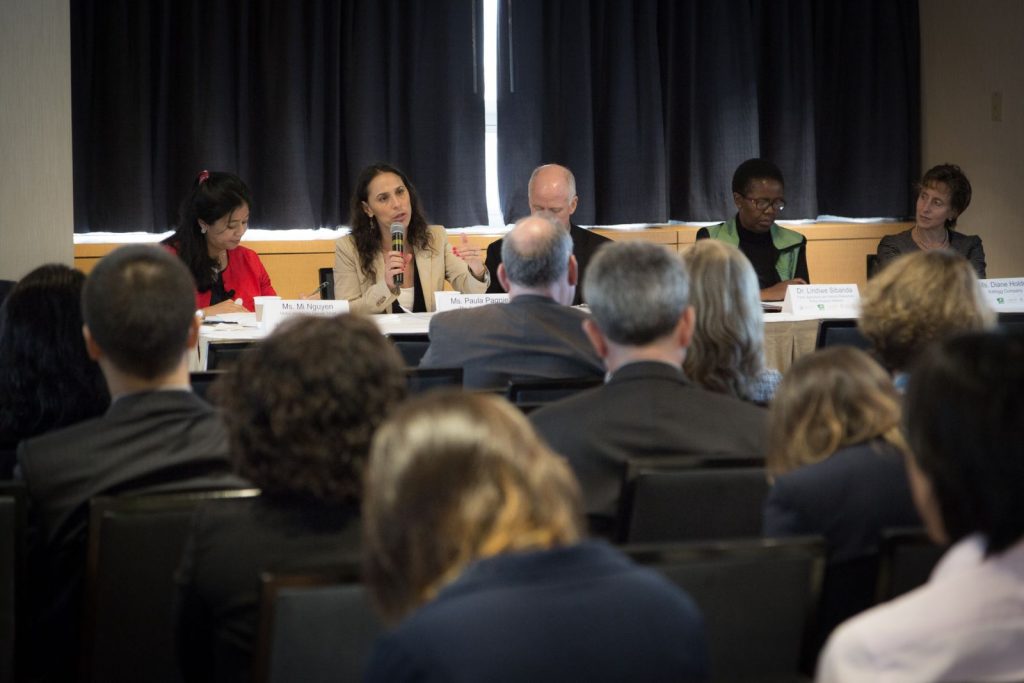Scaling up climate-smart agriculture
Experts panel on climate-smart agriculture innovations brought agriculture to the forefront of the discussion on climate actions during Climate Week NYC 2016.
This story originally appeared on the CCAFS website.
The Global Alliance for Climate-Smart Agriculture (GACSA) in partnership with the Technical Centre for Agricultural and Rural Cooperation ACP-EU (CTA), the International Research Institute for Climate and Society and the CGIAR Research Program on Climate Change, Agriculture and Food Security (CCAFS) jointly hosted a panel of international experts to highlight the ongoing work and what has been achieved, as well as discuss the next steps to scale up climate-smart agriculture (CSA). The event was held as part of Climate Week NYC 2016 and coincided with the United Nations’ first General Assembly meeting since the adoption of the Paris Agreement in December 2015.
Lindiwe Sibanda, CEO, Food, Agriculture and Natural Resources Policy Analysis Network (FANRPAN), recognized the partnerships amongst FANRPAN member countries allowed for the initial foundational work to take place. Alliance networks such as GACSA provide a research platform for studying and learning from best practices across countries and continents. FANRPAN is active in 17 African countries, and the success cases that stand out—Tanzania, Kenya, and Zambia—offer many lessons for the others to design and implement their own programs.
His Excellency Luis Felipe Arauz Cavallini, Minister of Agriculture and Livestock, Costa Rica, remotely joined the conversation to share what Costa Rica has done through agricultural system reforms to solve the intricately linked issues of poverty, food security, and environmental impacts. His Excellency shared examples of local policies and partnerships, such as a gasoline tax to promote ethanol produced from sugarcane byproduct and support for farmers to achieve carbon neutral certification.
Smallholder farmers produce about 70% of the food consumed worldwide and are the ones most vulnerable to climate change impacts, Nguyen remarked. Throughout the discussion, all speakers recognized that innovative approaches in CSA must focus on these key players. Having observed many successes and failures in FANRPAN’s regional network, Sibanda emphasized the importance of recognizing and linking all constituencies in creating new policies, especially smallholder and women farmers, to ensure there is sufficient participation and buy-ins from the local community.
James Hansen, CCAFS flagship leader on climate information services and climate-informed safety nets, highlighted climate information services as a CSA innovation that benefit smallholder farmers as well as a means to produce a policy-conducive environment that was also suggested by Sibanda.
According to Paula Pagniez, Senior Microinsurance Specialist and Vice President of Global Partnerships, Swiss Re Corporation, insurance and reinsurance (insurance for insurers) are one more solution within the toolkit of social economic development that can be developed and made accessible to the communities in areas most affected by climate impacts, after other preventative tools and techniques have been implemented. Smallholder farmers particularly benefit from climate-informed early payouts that help them stockpile water and feed to prevent crop and cattle losses from the beginning, when the risks are high.

Swiss Re’s Paula Pagniez. F. Fiondella (IRI)
Sibanda recognized that, even through a supportive regional network, governments cannot do it alone but rely on partnerships such as with NGOs and the private sector. On the other hand, while private companies can use their global presence and leadership to spur innovations and make tremendous impacts through their supply chain, they cannot accomplish this without working with government agencies in country and the NGOs that have the local experience and expertise. This is the point echoed by the two speakers representing companies from the private sector.
Pagniez shared that in order for insurers and reinsurers to reach the communities that they serve and to scale up in capacity to take more risk, they need public-private partnerships that are more permanent and longer lasting—like a mandate—rather than short-term joint initiatives. When insurance and reinsurance are framed within the safety nets provided to farmers, then governments and NGOs can step in to provide funding and subsidies when necessary until the insurance premium becomes affordable to farmers. Pagniez pointed to a collaboration with the IRI and CCAFS in Ethiopia’s small villages, where most smallholder farmers are now able to afford the insurance premium.
In the case of Kellogg Company, their partnerships with the International Rice Research Institute’s (IRRI) local entity and the Thai government, and with the U.S. Agency for International Development (USAID) and the Bangladeshi government have helped them successfully secure more efficient value chains in Thailand and Bangladesh. And in that same process, Kellogg Company empowered smallholder farmers—particularly women farmers who constitute more than the majority of farmers—with new skills and techniques, access to seed/crop insurance, more efficient crop varietals, and new market access opportunities. The company’s Vice-President, Diane Holdorf, shared that their partnership in Thailand has recently been recognized by the Thai Royalty as one of the first successful public-private partnerships.

You must be logged in to post a comment.